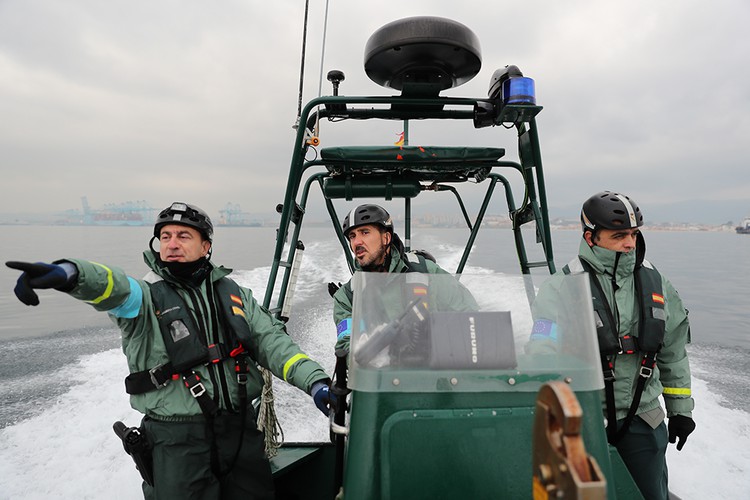The aspects of effective border protection and humanity collided when the working group of the European Parliament published a working document condemning Frontex.
The European Border and Coast Guard Agency, or Frontex for short, was founded in 2004. Its purpose is to help the member states of the European Union and the Schengen associated countries in protecting the external borders of the European Union.
In 2016, his role was expanded
with migration control, border management, and – if such a situation arises at the maritime border guard – with search and rescue.
Its task list: risk analysis, situation monitoring, vulnerability assessment, European cooperation in the field of coast guard tasks, sharing of criminal intelligence data, smuggling operations, external relations, rapid response, research and innovation, training.
In 2021, the Warsaw-based agency
came under fire, several investigations were launched against the organization.
In June of the same year, the European Court of Auditors and the European Ombudsman published a report in which they formulated a number of criticisms. The European Parliament's Civil Rights, Home Affairs and Justice Committee, or LIBE, decided in March 2021 to set up a working group to investigate concerns related to Frontex. The purpose of the working group (FSWG) was to continuously monitor all aspects of the agency's operation, including the use of resources necessary for integrated border management, as well as the correct application of the EU acquis.
In the first four months of its existence, the FSWG conducted a fact-finding investigation. The FSWG held eight public and five closed meetings during the fact-finding investigation, opened an e-mail account for incoming evidence, contacted the United Nations High Commissioner for Refugees (UNHCR) and organized an online meeting with Frontex leadership. His report published on July 14, 2022 - which has not yet been presented to the full LIBE, so it is only a working document - covers three major areas:
1. allegations of violations of fundamental rights in which Frontex staff are reported to have been involved, knew about and/or failed to act;
2. Frontex's compliance with fundamental rights;
3. management, supervision, reporting procedures and handling of complaints.
Unclear human rights violations
In the following/below, we will cover the first part in more detail. The apropos of this part of the report is that in recent years, non-governmental and intergovernmental international organizations have presented many cases that
exemplify alleged violations of fundamental rights, pushback and collective expulsion
in member states located on the external borders of the EU. UNHCR, the Greek Ombudsman, Amnesty International, Human Rights Watch and other organizations have repeatedly drawn attention to the fact that the border and coast guards in these countries follow a pattern of behavior that endangers lives at sea and endangers access to asylum , and violently deters people from landing on the shore and thus from submitting asylum applications. Among others, the UN High Commissioner for Human Rights and Migration and the Parliamentary Assembly of the Council of Europe have expressly stated that some EU member states violate human rights and the law of the sea.
Since March 2020, more attention has been focused on illegal forced returns and collective expulsions. That's when a Greek case broke out, according to which
so-called pushbacks were carried out by unidentified official persons wearing uniforms and masks, armed with weapons,
deportations following the arrival of migrants on the islands or peninsula.
However, it is not clear whether Frontex was directly involved in these alleged actions. In April 2021, the Greek ombudsman published an interim report on the "pushbacks" on the Greek-Turkish land border, finding that the Greek authorities had failed to investigate and respond adequately to the situation, and had consistently denied allegations of wrongdoing.
At the very least, Frontex acted unprofessionally
According to reports by the Netherlands-based investigative journalism group Bellingcat, which also involved other media outlets, Frontex planes were over the sea near the Greek-Turkish border when the alleged return operations were underway. According to the reporters
Frontex was not only aware of the actions, but was either inactive or directly cooperated with the offending authorities.
As a result of the accusations, the Board of Frontex ordered an internal investigation in November 2020. In its final report of March 1, 2021, the board of directors concluded that the Frontex regulation was not violated in 8 of the 13 incidents raised by the Bellingcat report, and that 5 investigated incidents could not be clarified. In May 2021, the 5 cases in question were also closed and recommendations were adopted regarding, among other things, the improvement of reporting mechanisms and follow-up measures by national authorities.
However, the FSWG has now concluded that:
• Frontex generally ignored the reports of reliable organizations,
• did not respond properly to individual internal comments either,
• although they did not find convincing evidence of the direct implementation of deportations and/or collective expulsions by Frontex in the case of serious incidents, it did not follow up violations in the Member States "immediately, vigilantly and effectively", i.e. it did not prevent them and did not reduce the risk of their future occurrence,
• there are deficiencies in Frontex's control, reporting and evaluation mechanisms and
• in the framework of cooperation with member states, and 6. the lack of cooperation of the executive director (who, for example, did not expand his own staff with fundamental law experts) is harmful,
they expect more proactivity from the board in recognizing the risk of violation of fundamental rights.
The manager resigned
The LIBE Committee v. Frontex case has two expectations,
it shows the clash between effective border protection and humanity in all circumstances.
Although it is not the agency but the member states that are responsible for the retrenchments, the European Parliament can give a clear political signal to the European public opinion and institutional system in a relatively short time with this report. Unlike the governments of the Member States, Frontex is operated from the EU budget, so it is easier to put pressure on it – surrounded by the governments' denials and accusations in the press.
And he gave in to this: Managing Director Fabrice Leggeri, without even waiting for the working document to be completed, resigned from his position at the end of April.
Nikolett Pénzzvaldi, researcher at the Migration Research Institute
Featured image source: frontex.europa.eu












